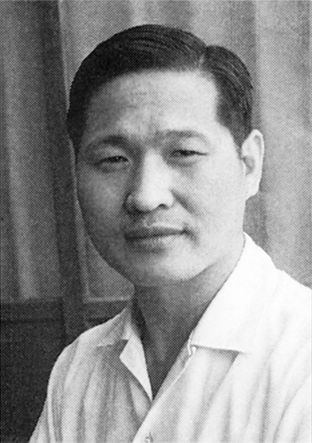Updated May 13, 2023
The Tragedy of the Six Marys – Sun Myung Moon is the real Satan!!
Fleeing to the South to Escape the War
The translation of this chapter from the Japanese has not yet been re-done. About half of content is missing. All the photos from the book, and more, are here. The Japanese text can be found HERE. Korean text HERE.
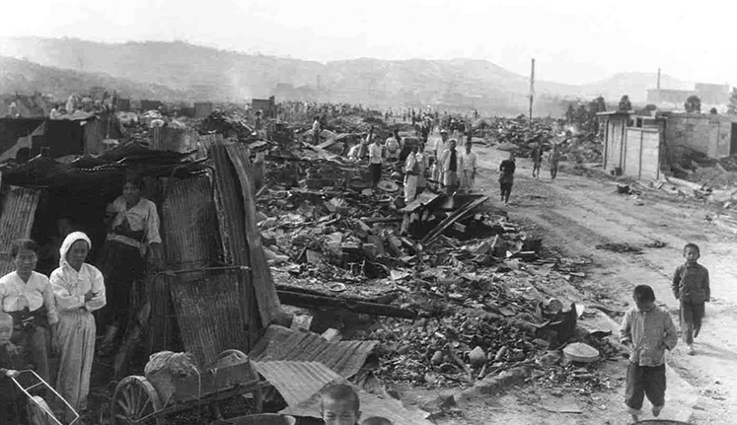
▲ Seoul city turned into ruins during the Korean War. (September 1950)
From Pyongyang to Seoul
Pak Chung-hwa’s foot fractured by thugs 50
I arrived in Pyongyang three days after escaping from the bombing at Heungnam. The day after I met my family, who were staying in a church, I tried to find Kim Chong-hwa’s house – but I couldn’t. On August 18th, 1950, the South Korean government had moved to Busan. They had been pushed back by the North Korean army. The spirit of victory was strong on the streets of Pyongyang. However, the mood changed very quickly when U.N. troops captured Pyongyang in September following the Incheon landing.
One day I was surrounded by a gang of thugs who called themselves a security force. They were just thugs who joined the North Korean side when it was in control, and later swapped to the opposite side. They said, “You were a real communist who served as a company commander in the North Korean army. We will kill you!” Then some of them hit my leg with hammers. My ankle was broken and I couldn’t move. I thought that my life was going to end there. An unexpected twist of fate saved me. Fortunately, I was rescued by Korean Military Police. I was questioned, but because I had been imprisoned in North Korea I was soon released. All the other prisoners were executed. They were shot.
I was a black belt in judo, but I really needed to get treatment for my injury. There were no hospitals in Pyongyang that were functioning.
Reunion with Yong Myung Moon 51
On October 27th, Kim Won-pil and Mr. Moon Jong-bin visited me. They said that Mr. Moon had been released from prison and was looking for me. It was an unexpected visit, and I was very happy to hear the news. I was taken on a handcart to Ok Se-hyun’s house, which was located on a hill. Mr. Moon was happy to see me. At that moment I could not stop from crying and holding his hands. It seems that he had walked to Pyongyang after his liberation by the U.N. troops. Ok Se-hyun must have been rich, considering the big house she was living in. There were many rooms, all in Japanese style.
We lived together like a family: Ok and her daughters, Chung-ae and Chung-soon, and Mr. Moon, Kim Won-pil and Mr. Moon Jong-bin. A week later, Ok’s husband, Woo Ha-sup, and his family returned after their escape. We had to move out of our rooms so they could move in. We decided to rent a room in Susung-ri, and we moved there. Mr. Moon, Kim Won-pil, Mr. Moon Jong-bin, and I started living together. Mr. Moon was going around asking for news of his acquaintances. He asked Kim Won-pil to tell people of his release. On December 2nd, 1950, there was another order to again leave Pyongyang.
The Chinese army had entered North Korea. The South Korean and U.N. troops were forced to retreat. The counter-attack by the North Koreans and the Chinese was very rapid. I could not sleep that night because of the noise of the bombing.
To keep my word I abandoned my family to obey Moon 52
We decided to flee to South Korea. However, at that time I could not walk because of my injured leg. Kim Won-pil helped to transport me on a bicycle. We left Pyongyang on December 4th, 1950. It was winter but the weather was not that cold. We decided to stop by my home in Daedong-gun. My family welcomed me. They did not want me to flee to South Korea because they were worried about my bad leg.
My nephew, Chung Geun, desperately tried to dissuade me, but Mr. Moon then persuaded my family that it was the right thing for us to go to South Korea. It would not have been possible for us to achieve our goal in North Korea. He told them that we had to follow the will of God. I also decided to go with Mr. Moon, since I had promised to follow him while we were in prison. I said goodbye to my 80 year old mother, and asked my wife to take care of the family. My daughter asked me to take her with me, but Mr. Moon objected to the idea. Mr. Moon also persuaded Mr. Moon Jong-bin to wait for a later opportunity to come to the South.
We thought that we should cross the Daedong River as soon as possible since the Chinese troops were moving south very quickly. We found a boat to cross the river. We stayed at my older sister’s house that night. There were many people trying to flee to South Korea. The next morning, on December 5th, we started our journey south. We loaded some food – that my sister had given us – onto the bicycle. My sister thought that Mr. Moon was a pastor and asked him to take care of me. That moment is etched into my memory. After that day I did not see them again for 43 years.
A man’s promise to stay together until death 54
The escape route to the South was full of refugees. Tens of thousands of people were slowly moving to the South, many hand in hand. We arrived at Gahak-ri at around noon. We could hear the sound of a bombardment from the west. It was dark even though the sun had not yet gone down. That night we decided to stay at a farm house. It appeared that no one was living there and that the owner of the house had fled. We found some food that had been left behind. It seemed to us that Judgment Day had arrived. The people had disappeared. I saw a home destroyed by war, and many thoughts came to my mind.

▲ Hordes of refugees fleeing from the North to the South during the war.
Won-pil prepared supper. It was white rice and water kimchi. We prayed before eating. Mr. Moon said, “Even though Chung-hwa is suffering from an injured leg, he will recover soon. He will soon walk again.” Being concerned at my sad expression, he continued, “We are going to the south to begin a new history. We are not going just to escape. I was going to build a ministry in Pyongyang, but I could not because of my imprisonment. We can succeed in the south.”
We lay down to rest, but I could not sleep. Won-pil went to sleep quite quickly, but Mr. Moon seemed to be awake too. He might have been thinking about our future. Because in the prison I had promised to stay with Mr. Moon forever, I had left my hometown and my loving family. I had finally come to this place with my broken leg – all because I believed that Mr. Moon was the messiah. I felt tired, and finally I fell asleep. On our flight south, we were wearing white silk trousers and rubber shoes. We covered our faces with bandanas. We must have looked very strange.
A difficult refugee journey 58
The way to the south would not have been difficult if we had travelled on the side of the main road, but there were American Military Police guarding the road. The refugee route was narrow and arduous. As time passed, the number of refugees increased enormously. The narrow roads were full of people. Even though there was no guarantee of safety in the south, the refugees maintained their hope.
The luggage we carried lessened each day. We had to throw away anything that was not completely necessary. As the days passed we were becoming exhausted. Twenty days later, we had almost nothing left to carry. The cold of winter became hard for our tired bodies to endure. When we found any warm place, we rested. We just did not worry about sleeping and eating.
One night we arrived in a village. We were looking for somewhere to sleep. We found an empty house. It must have belonged to a rich family. Household goods and food still remained there. Won-pil made supper for us and we ate. I was not sure if I could go all the way to Busan with my injured leg. We were travelling together with so many other refugees. We continued to move south. Near Gwangju, there was a steep hill. The length of it was about 150 m. Going up the hill on a bicycle seemed to be impossible. The thousands of refugees were struggling to move forward. I thought that I was holding back Mr. Moon and Won-pil. I said to Mr. Moon, “I think I’m done here. Just leave me here and go on. I will accept whatever my fate is.” Then Mr. Moon got angry. He said “We promised to live together until we die. Whatever happens, let’s trust in our God. Don’t worry.” Mr. Moon carried me on his back and we were able to go up the hill. I was moved by his attitude, and again determined to stay with him forever.
Finally arrived in Seoul 60
There were rumors that there were some communists hiding among the refugees. Therefore we had to endure being shot at by the U.N. troops. In this way we continued our journey on towards Seoul.
On December 27th, we finally arrived in Seoul. First we visited Kwak’s house in Youngdeung-po. Kwak was Mr. Moon’s friend but he had already fled to Busan. His house was a second story western-style house. [two story house?] We decided to stay there for a while. Seoul was Mr. Moon’s second home since he had stayed there during his school days, and after Mr. Moon had finished his studies in Japan, he had again stayed there for a while. We visited an old lady by the name of Lee Ki-bong. She did not seem to welcome Mr. Moon. Later, when we met some more of Mr. Moon’s friends, they did not welcome him either.
At that time, any men in Seoul were supposed to be drafted into the National Defense Force. I was not picked by them because of my injury, but Mr. Moon and Won-pil were. After our difficult journey to Seoul, I was left alone.
Seoul was a new place to me. I did not know anyone. Besides, it was war time. Mr. Moon’s friends would not welcome me either. What should I do? Nothing came to mind. All I could do was to wait for Mr. Moon. Fortunately, he and Won-pil soon returned because they had not passed the physical test. We were together again.
On January 2nd, 1951, the order to evacuate Seoul was given. Again the communist troops were approaching Seoul. Once again we had to flee. This time our destination was Busan.
We were fortunate in getting ID passes thanks to Eu Heung, the chief of the security office. We were really lucky. Whenever we were stopped and checked, we had to show our IDs.
Since we had no money left, we took some suits and valuables from Kwak’s house with us. Anyway, it was clear that either the North Korean or the Chinese troops would take them. Seoul was recaptured by the North on January 4th.
From Seoul to Busan 63
Our second flight
On January 3rd, we began our journey to Busan, which was about 500 km away. It was our second refugee journey. It was as if we were being pushed by something. We were escaping to maintain our freedom. We took the central road instead of the Seoul to Busan road. That was because one of my relatives lived in Jaechun, and we hoped to get some help there.
We passed Sungnam and left for Incheon. This refugee route was different to the first one. It was like refugee of family. As the sun set, we reached a village. People were still staying in their homes. We could not find an empty house anywhere. So we asked for help at one of the houses. They let us stay. Since we had experience of being refugees, this time it was not as hard.
The next day, before sunset, we tried to find a house where we could rest. Since we had no rice left, we visited a nearby village. All the shops were closed. We needed some rice. We wanted to trade the suits we had brought with us. An old lady accepted the barter.
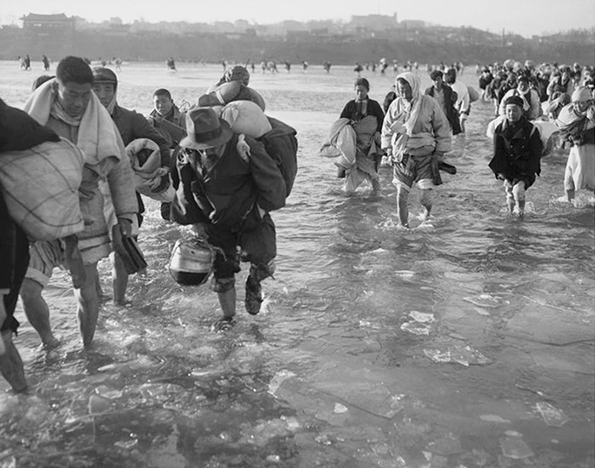
▲ Refugees cross a river in winter
When we arrived at Jaechun, my relatives had already left. I was disappointed because we could not get any help from them. U.N. troops ordered us not to take the main road. So we had to take the difficult mountain roads. My leg slowly got better and my walking improved.
We met some Military Police and they took Mr. Moon and Kim Won-pil away. I was worried, thinking that it could be my third parting from Mr. Moon. I was alone again. I didn’t know what to do. After a while they came back. They had been forced to do some work. There was a downhill stretch and I could walk down without help. Mr. Moon told me, “You can throw the cane away now.” So I threw it away and managed to walk without it. In this way our journey continued.
The parting at Kyongju 66
We arrived in Kyongju in the evening. The town was full of refugees and again there were no empty rooms. We has difficulty finding a place to stay. At one house a man in his 30s came out. We explained our situation to him, and asked him if we could stay for a night. He let us in. He said that his place was a factory for making dining tables. He had had to close it down because of the war. Won-pil went out to buy food. He came back with some squid and made squid porridge. Won-pil gave some to the owner of the house.
He was from Hwanghae-do in North Korea. He said that he came to Kyongju when he was young. His parents were still living in North Korea. His name was Jang Man-young. We stayed with him for three days. We had to make our own meals. Because there were so many refugees, we could not stay there for long. When we told Jang that we were going to Busan, he said that I looked weak and old, and it would be better for me to stay with him until the others had settled down in Busan. I refused his offer, but Mr. Moon spoke to me and said it was a good idea. He said that he would call me when he was settled in Busan. So I stayed at Jang’s and they left for Busan. My mind was in turmoil. I had come this far – going through many hardships with Mr. Moon – but now I had to part from him again.
I thought that it would be easier for them to get to Busan without me. So I accepted to stay behind. When Mr. Moon returned to Kyongju later, he told me that he could only just get a ride on a train. He had arrived in Busan on January 20th, 1951.
The visit of Moon who wanted help for his financial 68
I alone became Jang’s house guest in Kyongju. In May the weather became warmer. I thought that I should do something for them in return for my staying there. I discussed with Jang about his resuming the dining table business. I suggested that I could sell his products if he started to make them again. So we started the business with the help of Jang’s son. I put 20 tables on a bicycle and went to Pohang, Youngcheon, and Ulsan to sell them. Even though I was not good at selling things, I managed to sell them anyway. I gave the money to Jang.
There were several markets in Kyongju. I also visited five-day interval village markets near Kyongju. Besides that, I tutored Jang’s son who was a middle school student. I could barely pay my dues as a house guest.
On March 7th [1952], Mr. Moon suddenly arrived to visit me. I was very happy to see him. I had no money to treat him in a good way. I was living in the corner of the factory. Jang gave me some money and with that I could buy Mr. Moon dinner, but that was all.
Mr. Moon told me the news of what had happened in Busan, and about his future plans. It was like a dream. We talked all night. The next day Mr. Moon told me he had to go back to Busan. I could not go with him because my situation was also not that good. There was a market I had to go to in Ulsan, so we went there together by train. Mr. Moon watched me sell the dining tables. After lunch he left for Busan. I wanted to give him some money, but the business on that day was not good. It was our first meeting for almost a year, and a lot of things came to my mind. I thought that I should make a lot of money, so we could fulfill our dream for the future. Mr. Moon told me that Won-pil was working at a restaurant, and Mr. Moon himself was a house guest of one of his former fellow students. I thought that he would be in a difficult situation. (In fact, the reason for his visit was to check on living where I was.)
I had thought about how I could improve my financial situation. For now, all I could do was to sell the dining tables at local markets. If I just kept my sales business, how could I get to the next level? On the other hand I could go to Busan to be with Mr. Moon. I decided to stay where I was for the time being.
Reunion with Ok Se-hyun from Pyongyang 71
On January 4th Seoul fell again to Communist forces. Two months later, on March 4th, it was recaptured by U.N. troops. Thee war was in a state of flux; both sides were advancing and then being beaten back. Cease-fire negotiations were on-going. However, civilian casualties passed two million, and more than ten million people were separated from their families. It was a dark time.
In the spring of 1953, Mrs. Ok Se-hyun came to visit me in Kyongju. I was very pleased to see her. She was able to come south because her oldest son had brought her by truck [which he was able to do because he was in the military]. She told me about her difficult life as a refugee, and that she had completed writing a manuscript about Mr. Moon’s teachings. I was touched by her dedication to complete the manuscript under such hard circumstances. I made up my mind to publish the book as soon as possible.
We talked about the need for financial stability so we could support Mr. Moon as soon as possible. And I was told that Kim Won-pil was working for the American military. He said that they had established a church in Bumil-dong and people were coming to listen to Moon’s preaching. After staying one night with me, Mrs. Ok returned to Busan.
Later a pastor named Lee Yo-han came to see me. He said that Mr. Moon had sent him. His message was, “Since we have many believers in our church, you’d better come to Busan as soon as possible.” I thought that we had finally begun to expand so we could fulfill the will of God. I felt so thrilled. The next day Lee went back to Busan and I asked him to tell Mr. Moon that I would come to Busan soon.
I remembered what Mr. Moon had told me in the prison about the ideal world of God. Now the day of hope seemed to be just around the corner. In a world without sin, jealousy, betrayal, conspiracies and war, we needed to only to work for enjoyment. We would be able to go anywhere in the world and stay in any place we wanted. The world of giving and not taking seemed to be coming where there was respect for others and not criticism of them. It felt real. This ideal would spread over the entire world. We would be able to communicate freely with each other. I was thankful to Mr. Moon for this dawning new ideal world. My mind became full of such ideas as I prepared to travel to Busan.
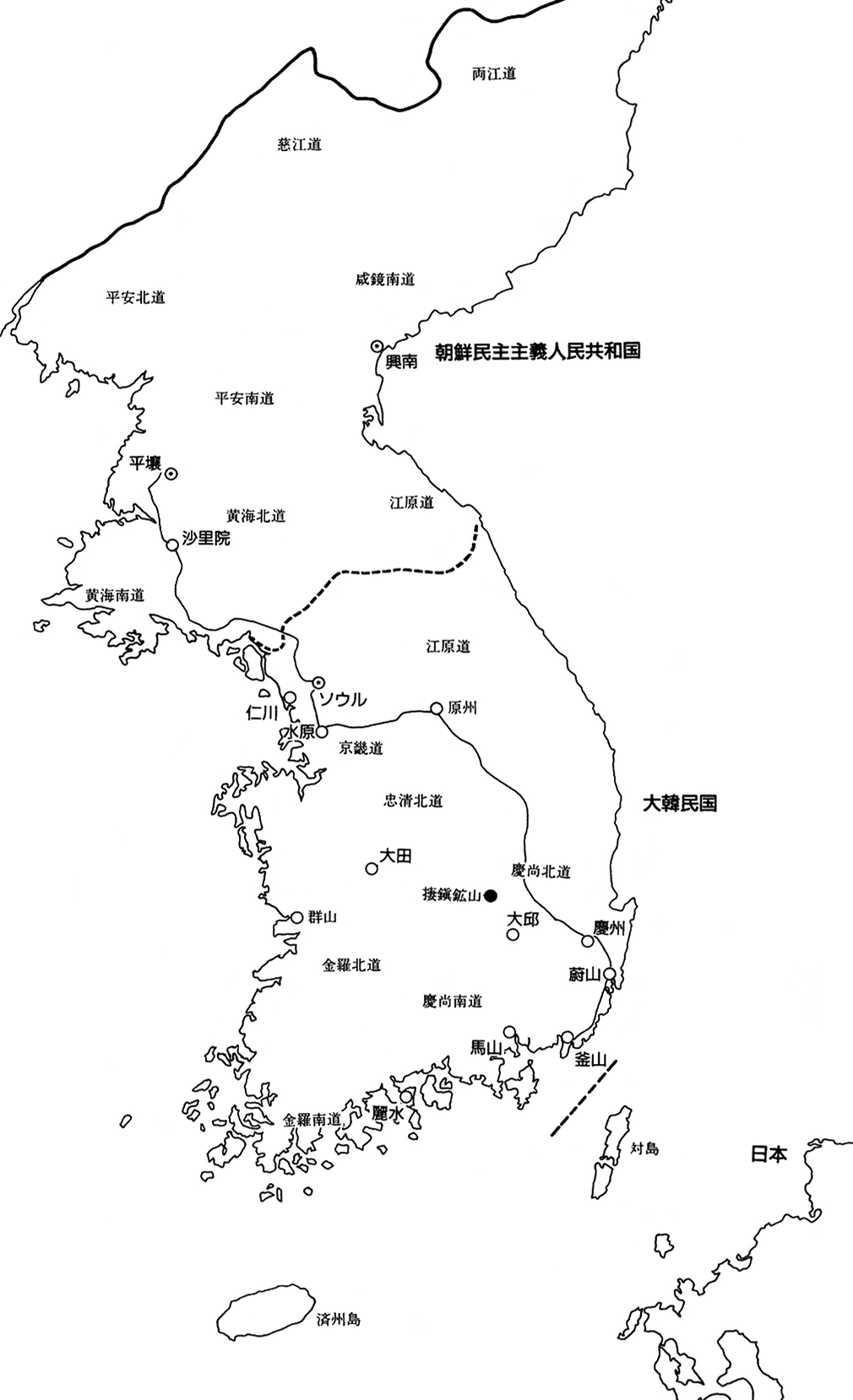
▲ Evacuation route from Pyongyang in the north to the south.
❖ Note: The route drawn by Pak on the above map does not include a detour to Yongmae Island off the west coast of North Korea. Kim Won-pil included such a detour on a map in his 1988 testimony book, The Way of the Pioneers, published in Japan. The reason for Kim’s invention of the story was the discovery of a photo of a refugee carrying another on his back through water. Pak was invited to the church headquarters in Seoul to confirm if he was in the phot. He immediately said it was not of himself or Moon. In a second edition of The Way of the Pioneers, Kim’s fictional account of a laborious journey through the sea to the island was removed, since Kim realized his fraud had been uncovered. The photo was of a river crossing at a different location and at a different time to when Moon, Kim and Pak made their journey to the south of Korea. Below is the photo as used by Kim. Since Kim was with Moon and Pak on the journey, this proves Kim Won-pil to be a blatant liar.
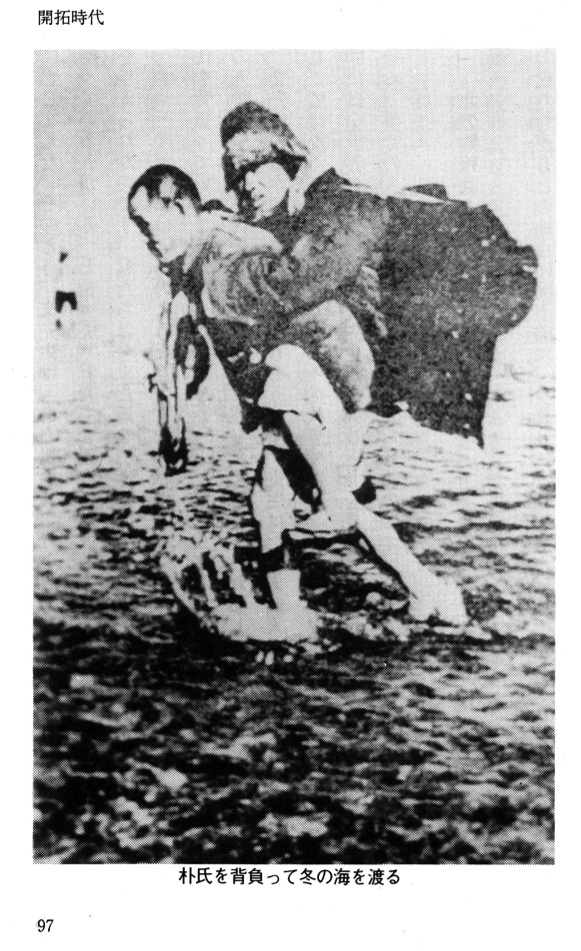
▲ Page 97 of Kim Won-pil’s book: 朴氏を背負って冬の海を渡る “Mr. Pak being carried across the winter sea.”
[Sun Myung Moon and Mr Pak are not depicted. It was not the sea. It was a refugee carrying his father across the Han River at Chungju on January 14, 1951. The photo was taken by a US Army photographer who recorded the details.]
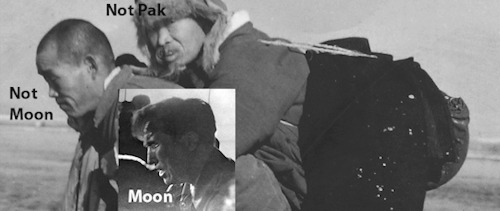
▲ Inserted is a photo of Moon taken in the 1950s.
Below is Kim’s fraudulent map, which he corrected in his later books. The detour to Yongmae Island 龍媒島 용매도 is clearly labelled.
▲ Page 43 of Kim Won-pil’s book showing a detour to Yongmae Island that Kim added to his narrative after the refugee photo was published in a Korean newspaper.
Pak Chung-hwa’s description of the journey in this book has proved to be the authentic one. See Chapter 6 for Pak’s comments on the photo.

